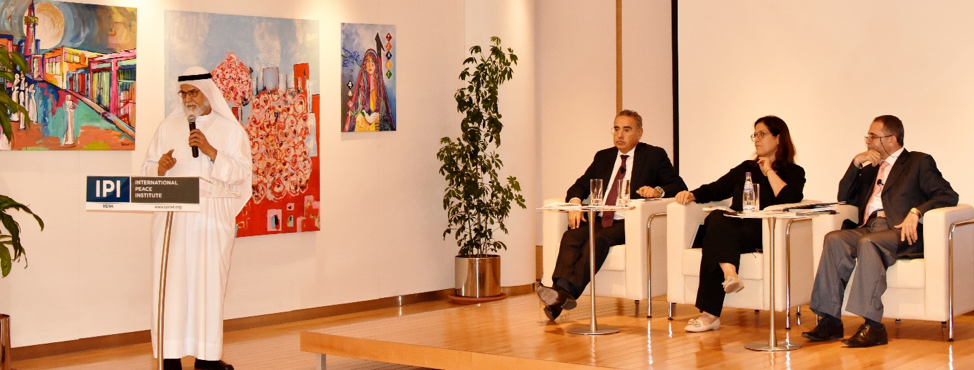
An audience of ambassadors, government officials, dignitaries, religious leaders, young people and the media gathered at IPI’s regional office in Manama for the launch of a new book, The Arabs at the Crossroad. The book’s author, Special Envoy of the Royal Court, Samira Rajab engaged participants in a constructive debate on the most pressing issues in the MENA region, drawing on developments covered by the book.
Nejib Friji, Director of IPI-MENA, gave opening remarks. As the book provides insight into a number of the questions raised by members of the IPI Taskforce on Regional Integration in the Middle East, he said the launch was timely. The taskforce calls for critical assessment of where the region is heading, as well as, looks for ways to engage constructively with challenges.
Ms. Rajab elaborated on the “game of nations” described in the book, placing it in historical and political context. “In view of the formidable obstacles and knowledge barriers,” she said the book aimed to “shed some light” for Arabs and researchers alike.
She noted that in an environment of change, “cohesion and Arab integration as a single bloc force,” was important.
Mokhtar Ben Abdellawi, Professor of Philosophy and Arabic and Islamic Studies at Hassan II University in Morocco, stressed the need for integration and a multi-pronged approach to face the integration challenges in the MENA region.
Discussant Mahmood Sayed Daood, Professor of Politics and International Relations at the University of Bahrain, stated that “one of the singled out deficits in knowledge and education created generations with cultural shortfalls that affected the level of cultural, political and moral maturity.”
Reflecting on the recent wars in Iraq and Libya, which have thrown the MENA region into chaos, he lamented the absence of international law in those conflicts. He referred to the author’s calls for restoring the central role of the state, religion as a moderate creed, and regional order to achieve integration, cooperation and development.
The conversation continued with government officials and diplomats, including Hala Al Ansari, Secretary-General of the Supreme Council for Women. She called for a more thorough approach to solving the regional deficiencies, highlighting the pivotal roles of women and civil society in finding a way out of the multipronged crisis.
Abdullatif Al Mahmood, Head the Al-Fateh National Coalition, a main political party, said, “Arab thinkers and politicians should stop blaming the West and foreign forces for our failures. Our deficiencies are our own responsibility.”
Libyan Ambassador to Bahrain, Fawzi Taher Ahmed Abdelali, stressed that “looking for the roots of problems should be done within our political, cultural and intellectual circles, not abroad. Most of our problems are caused by our systems.”
Ahmed Rachid Khattabi, Moroccan Ambassador to Bahrain, emphasized that “the key role to finding solutions to our problems remains within the intellectual sphere.” Despite this, many intellectuals remain sidelined. He also stressed the need to reform educational programs that are not fit for purpose.
Egyptian Ambassador to Bahrain, Soha Ibrahim El Far, referred to the importance of regional integration. Such challenges should be met by all layers of society, she said, urging IPI to further analyze this through an inclusive process involving the private sector, youth and civil society.
Abdulla Al Moghabi, a representative of the Muslim Shia community and a member of IPI-MENA’s Interfaith Dialogue, criticized agenda-oriented religious figures who have “hijacked religion” to fan the flames of sectarianism and division.
Other discussants included Honorary Judge of the Constitutional Court, Noefel Ghorbel, and Fawzia Rasheed, a writer for Gulf Daily News (GDN).
The event was moderated by Nejib Friji.
Read the related coverage in Arabic and English here>>







